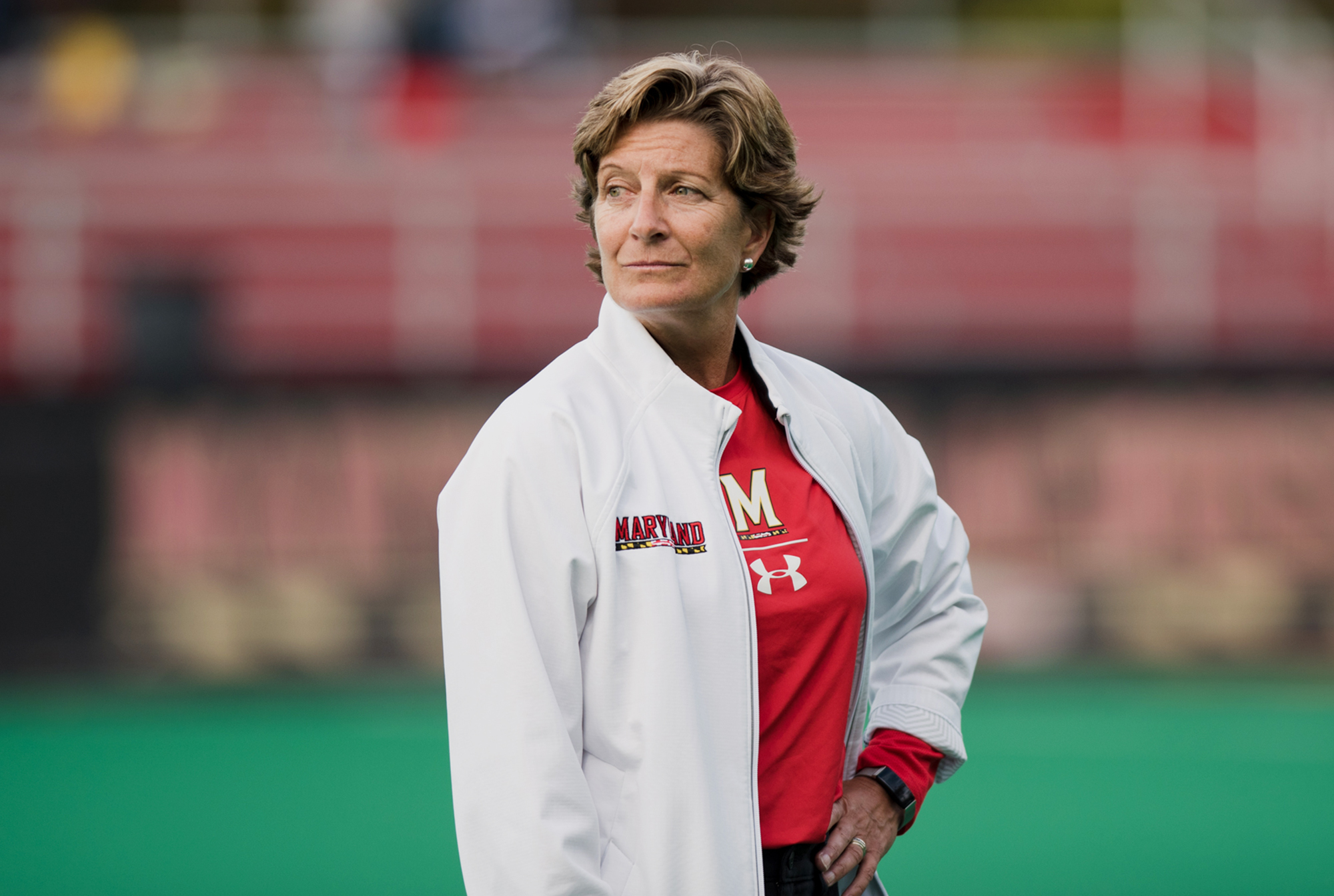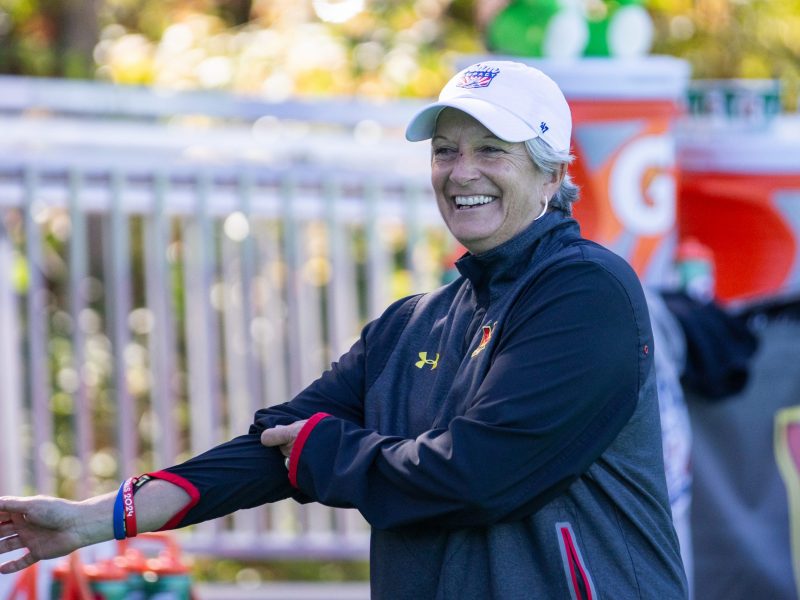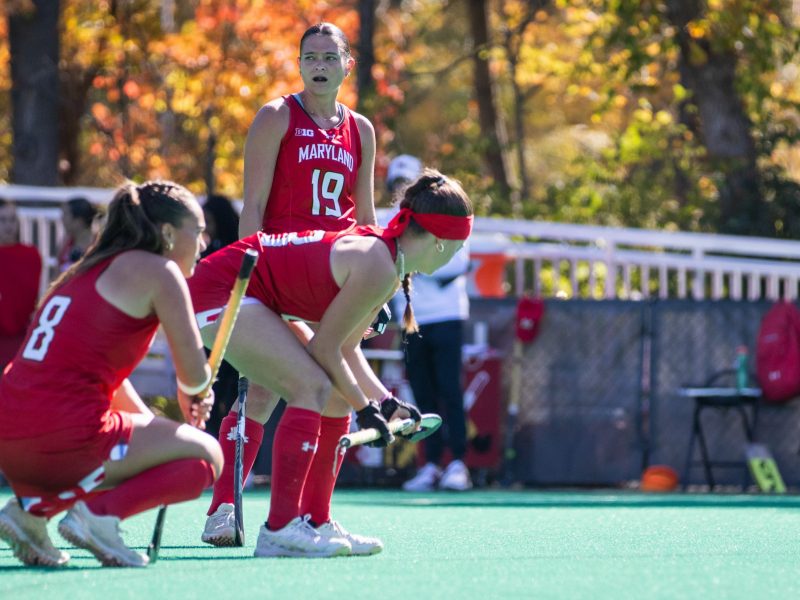In November 2012, Maryland field hockey coach Missy Meharg was at a social event with other coaches during the NCAA Final Four at Old Dominion.
The Terps had just dropped a tight match to Princeton, which would go on to top Maryland rival North Carolina in the national championship. But little did Meharg know that rivalry wasn’t lasting much longer.
“I hear you’re going to the Big Ten,” an ACC coach said to the Terps’ skipper.
Meharg, still a bit dejected from the tough loss, looked at them.
“I don’t know what you’re talking about right now,” Meharg responded.
But the next morning, as she was packing up to return to Maryland, she got a phone call from then-athletic director Kevin Anderson confirming the shocking news — her team was headed to the Big Ten.
It was a drastic switch for the Terps, but the team couldn’t have had a better coach to guide them through it.
And as Meharg has continued racking up wins since joining the Big Ten, building the conference into an elite division of field hockey, she collected her highly-anticipated 600th career victory on Sunday.
[Missy Meharg wins 600th game as No. 8 Maryland field hockey holds off No. 17 UConn, 3-2]
When Meharg realized her team would be going to the Big Ten, she had just completed her 25th season at the helm of this program. She had collected seven national championships and 10 ACC tournament championships to establish her program as one of the nation’s best — partially due to the competitive nature of the ACC.
Playing schools among the likes of the Tar Heels, Duke and Virginia, the ACC featured a very fast style of hockey, contrary to the more physical style of the Big Ten.
During their first year in the Big Ten, Meharg and then-assistant coach Dina Rizzo wanted to get their players used to the physicality the conference brings. So, they got their hands on some football pads.
“They would just, within our drills, kind of get on your body a little bit with the padding,” former Maryland player Welma Luus said.
Luus, a Pretoria, South Africa, native, played both tennis and field hockey during her time in College Park. And she was part of the group that experienced the conference realignment.
“It was definitely a lot of uncertainty,” Luus said. “The Big Ten, at that point, wasn’t necessarily the strongest conference for field hockey.”
For decades, the Terps were almost always in the National Field Hockey Coaches’ Association poll top 10 — rarely missing out on the top four. That said, Meharg had one of the most well-known and respected programs in the nation and couldn’t let that reputation slip.
“My first thinking was, well, first and foremost, we need to have a preseason tournament or a pre-conference tournament,” Meharg said. “That was going to give media coverage, regional coverage to the Big 10 and the ACC, so that we could kind of jump on their back.”
At the onset of Meharg’s career, an administrator informed her that as much as a coach might want a program’s success to depend on field hockey itself, it would be recruiting and scheduling that win championships.
In December 2013, Meharg was at her first meeting with her fellow Big Ten coaches. And her first question to her new competitors was about how often they played ACC schools.
At the time, there were only 11 total matchups, three of which would come from Maryland. But at that meeting, Meharg and the coaches agreed they wanted to get that number up to about 30.
Meharg’s main contribution to elevating her new conference has been the establishment of the Big Ten/ACC Cup, a tournament where the Terps and Northwestern play the Blue Devils and Boston College early in the fall.
And that competition has contributed to the Big Ten’s emergence as the dominant field hockey league over the last few years.
While Maryland split at this year’s installment of the Big Ten/ACC Cup, they — along with other Big Ten schools — have risen to the challenge of ACC schools. And the results have shown.
Currently, Iowa is ranked No. 1 in the NFHCA coaches’ poll for the first time in school history. The Hawkeyes are a spot ahead of Michigan, which reached the national championship last year, and Rutgers’ No. 3 ranking is its highest in school history.
Meharg’s squad is currently No. 8 — and sits sixth-highest among Big Ten schools.
[No. 8 Maryland field hockey stymied by Gianna Glatz, drops tight one to No. 3 Rutgers, 1-0]
“If you look at it now, you kind of see how that has grown field hockey,” Luus said. “The Big Ten definitely is up there, especially this year, as a powerhouse conference.”
Anna Dessoye played for Meharg from 2012-15, playing two years in the ACC and two years in the Big Ten. But when she was deciding to play for the dominant ACC program, it wasn’t the conference affiliation that played a large part.
“The majority of why I chose Maryland was the coaching staff,” Dessoye said.
Throughout her career, Meharg has almost single handedly made Maryland one of the nation’s best field hockey programs.
Her charismatic personality and energy have made numerous top recruits from around the Northeast region and all over the world choose to join the Terps.
And as that school switched to the Big Ten, so did those players.
Instead of traditional ACC forces dominating the field hockey world, schools such as Iowa, Michigan, Rutgers, Northwestern and Penn State have upped their game and are becoming popular destinations for the next generations of field hockey stars.



